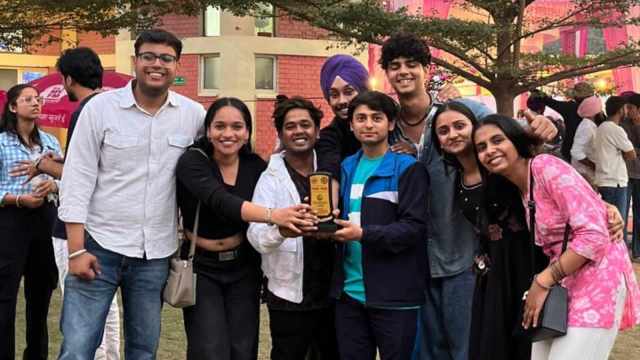Theatre club founded by Ayushmann Khurrana at Chandigarh’s DAV College continues to win hearts and awards
Agaaz, a theatre club founded by Ayushmann Khurrana at DAV College in Chandigarh, has become a cultural institution, celebrating the art of theatre.
 At DAV College, that legacy still speaks, paints and performs — even when it falls silent.
At DAV College, that legacy still speaks, paints and performs — even when it falls silent.Walk into the drama room of DAV College, Chandigarh, and the applause of seasons past seems to reverberate off its walls. It is the same room where a young Ayushmann Khurrana once practised his lines, where Yami Gautam took her early bow, and where generations have discovered that theatre is as much a way of living as it is an art.
Founded by Khurrana in his first year, Agaaz has grown into a cultural institution driven by expression beyond the ordinary. This year, it left an imprint at the Panjab University Youth Festival, with students winning awards across theatre and fine arts.
Their mime act, The Power of Silence, which won third prize, revisited the 2025 Pahalgam attack, connecting that tragedy with the emotional resonance of the India–Pakistan cricket match that followed. The piece imagined players refusing to accept a trophy from a Pakistani minister, a gesture of tribute to the victims.
“Charlie Chaplin did it for years. It’s about the body, not the voice,” said performer Arshdeep Singh. Injuries in rehearsal and even a hospital visit could not deter the troupe. “You can’t speak, but your body must never go silent,” Arshdeep said.
In the one-act play section, DAV won second prize for a production on mathematician Srinivasa Ramanujan, written by local scriptwriter Shivan Dhal and inspired by The Man Who Knew Infinity.
“We always talk about Einstein or Newton but rarely about Ramanujan,” said club vice president Nimar Kaur. “He was India’s own genius, guided by his Kuldevi Namagiri Thayar.” Before stepping on stage, the group unites in a circle to chant “Nishchay Kar Apni Jeet Karo,” their ritual of resolve and camaraderie.
The skit Animal Park, directed by Nishant Dogra, won the first prize for its spirited satire on animal cruelty. “We thought stronger issues would make better theatre, but animals can’t speak for themselves,” Nishant said. The highlight was a comic love story between a gorilla and a monkey that left the hall roaring.
Their closing line, “No animal has been harmed in this play,” struck sharply — a mirror to human hypocrisy. “We wanted laughter to carry meaning,” Nishant said.
In mimicry, Akhil Baluni bagged first prize with a sprawling range that ran from Sanjay Dutt to Gulshan Grover. “It’s not just about copying a voice, it’s about capturing a soul,” he said. After blanking out on stage last year, Akhil built his act around character arcs this time. The result was applause that didn’t stop.
Agaaz’s artists also shone. In collage making, they won first prize for Old Punjab, a piece evoking nostalgia through muted tones and shadow play. Shivam’s Cultural Harmony Rangoli took second place, executed without tools after a last-minute rule change. “Dance, rhythm, colour, symphony — that’s India to me,” he said. Installation artists Anant and Jatin won third for portraying Mother Earth’s journey from creation to devastation, closing with the warning that progress should not cost the planet.
Across decades, Agaaz has remained more than a club. It serves as a launchpad for storytellers who transform observation into art. From its stage productions like Question Mark, based on Pash’s poetry, to short films on caste and mental health, its voice continues to grow louder.







